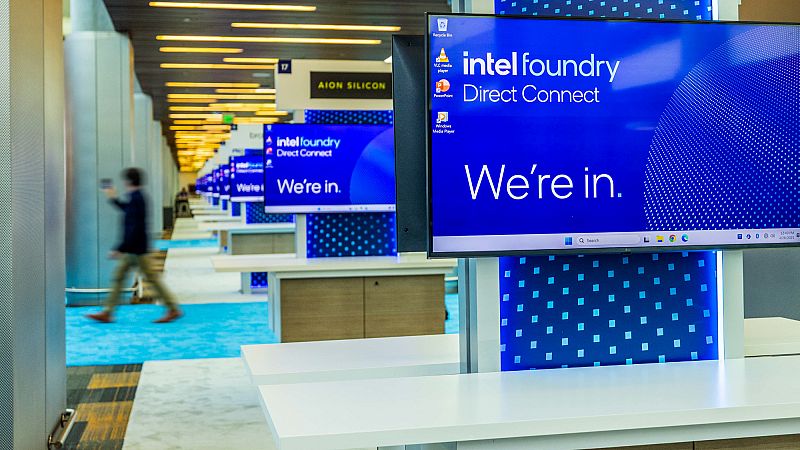
The US government could become the largest shareholder in Intel, one of the most important US technology companies, marking the first time Washington has sought ownership in a Silicon Valley icon.
US Commerce Secretary Howard Lutnick on Tuesday confirmed the US government is vying for a 10% stake in Intel, part of an unusual deal that would deepen the Trump administration’s financial ties with the major chipmaker.
The move comes weeks after US President Donald Trump called for Intel's CEO Lip-Bu Tan to resign due to what he claimed was a conflict of interest. This allegation was linked to Tan's previous role as a venture capitalist in China.
Although rare, it is not unprecedented for the US government to become a significant shareholder in a prominent company.
One of the most notable instances occurred during the recession in 2008, when the government injected nearly $50 billion (€42.94bn) into General Motors in return for a roughly 60% stake in the automaker when it was on the verge of bankruptcy.
At the time, even that bailout was seen as controversial despite GM's hardships because it was perceived as blurring the lines between state control and US free market principles. Unlike many European companies, US ones have insisted on a complete separation between government and private ownership of enterprises.
The government ended up with a roughly $10bn (€8.6bn) loss after it sold its stock in GM.
A misreading of the CHIPS act?
Intel historically led the world in semiconductor production, tied in particular to PC production and Microsoft. When the iPhone launched in 2007, Intel-dominated PC chips nonetheless failed to win a foothold in smartphones and tablets.
ARM-based chips, which are used by Apple and Samsung, became the mobile standard, leaving Intel stuck in the declining PC market.
Intel has also lagged in the AI race, with their traditional central processing units not being well-suited for AI workloads. On the other hand, competitors like Nvidia have surged ahead.
The CHIPS and Science Act, often referred to as just the CHIPS Act, was a bill passed in August 2022 by former US President Joe Biden in order to boost the local US semiconductor industry.
COVID-19 supply chain disruptions and US–China tech tensions highlighted how dependent the US had become on foreign-made chips, not just for consumer electronics, but also defence, cars, AI and infrastructure.
In November 2024, the US Department of Commerce finalised an agreement to grant Intel up to $7.86bn (€6.75bn) in direct funding through the CHIPS Act to support their semiconductor manufacturing and advanced packaging operations across Arizona, New Mexico, Ohio and Oregon.
Intel was among the biggest beneficiaries of the program, but it hasn’t been able to revive its fortunes while falling behind on construction projects spawned by the CHIPS program.
The company has received about $2.2bn (€1.89bn) of the $7.8bn (€6.75bn) pledged under the incentives program — money that Lutnick derided as a “giveaway” that would better serve US taxpayers if it is turned into Intel stock, which he said would be in the form of non-voting shares so the government wouldn’t be able to use the stake to sway how the company is managed.
“We think America should get the benefit of the bargain,” Lutnick told CNBC as he explained why Trump is pushing for the deal. “It’s obvious that it’s the right move to make.”
The notion of the US government holding a huge stake in Intel would have seemed inconceivable back in the company’s heyday when its processors were powering a personal computer boom that began in the mid-1970s.
But Intel’s ongoing struggles also means the US government is taking on a risky investment.
US government as biggest shareholder
The US government’s negotiations to become a major Intel shareholder are coming on the heels of a $2 billion (€1.7bn) investment Japanese technology giant SoftBank Group, disclosed late on Monday.
SoftBank is accumulating its 2% stake in Intel at $23 (€19.70) per share — a slight discount from the stock’s price when its investment was announced.
Intel’s shares surged nearly 7% to close at $25.31 (€21.74) on the news of SoftBank’s big bet on Intel, coupled with Trump’s plans for the company.
SoftBank invests in an array of companies that it sees as holding long-term potential. It has been stepping up investments in the United States since Trump returned to the White House.
In February, its chairman Masayoshi Son joined Trump, Sam Altman of OpenAI and Larry Ellison of Oracle in announcing a major investment of up to $500bn (€429.38bn) in a project to develop specific artificial intelligence infrastructure for OpenAI called Stargate.
“Semiconductors are the foundation of every industry," Son said in a statement. ”This strategic investment reflects our belief that advanced semiconductor manufacturing and supply will further expand in the United States, with Intel playing a critical role.”
Trump’s interest in Intel is also being driven by his desire to boost chip production in the US, which has been a focal point of the trade war that he has been waging throughout the world since he returned to the White House earlier this year for his second term in office.
“We want Intel to be successful in America,” Lutnick said during his CNBC interview.
Intel is valued at about $110bn (€94.4bn), meaning a 10% government stake would equate to roughly $11bn (€9.44bn) at current prices.
Other major shareholders include Vanguard, BlackRock, and State Street.
A 10% US government stake would almost certainly vault Washington ahead of Vanguard as Intel’s largest single shareholder, unless structured as non-voting shares outside the normal count.







